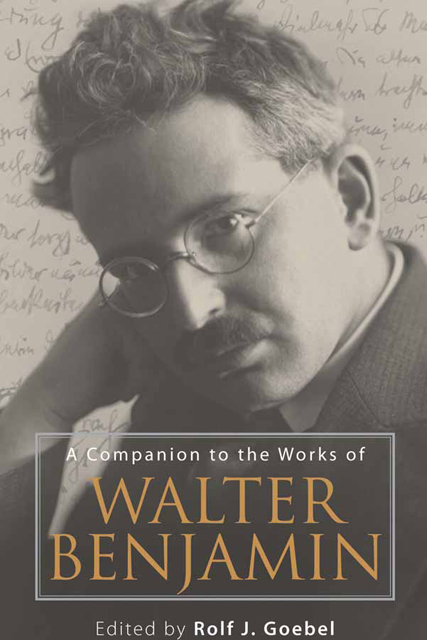Book contents
- Frontmatter
- Contents
- Preface
- Sources of Benjamin’s Works
- Chronology of Benjamin’s Major Works
- Introduction: Benjamin’s Actuality
- 1 Walter Benjamin's Criticism of Language and Literature
- 2 The Presence of the Baroque: Benjamin’s Ursprung des deutschen Trauerspiels in Contemporary Contexts
- 3 Lost Orders of the Day: Benjamin's Einbahnstraße
- 4 Literature as the Medium of Collective Memory: Reading Benjamin’s Einbahnstraße, “Der Erzähler,” and “Das Paris des Second Empire bei Baudelaire”
- 5 Benjamin in the Age of New Media
- 6 One Little Rule: On Benjamin, Autobiography, and Never Using the Word “I”
- 7 The Passagen-Werk Revisited: The Dialectics of Fragmentation and Reconfiguration in Urban Modernity
- 8 Benjamin’s Politics of Remembrance: A Reading of “Über den Begriff der Geschichte”
- 9 The Legacy of Benjamin’s Messianism: Giorgio Agamben and Other Contenders
- 10 Paris on the Amazon? Postcolonial Interrogations of Benjamin’s European Modernism
- 11 Benjamin’s Gender, Sex, and Eros
- 12 Sonic Dreamworlds: Benjamin, Adorno, and the Phantasmagoria of the Opera House
- Select Bibliography and List of Further Reading
- Notes on the Contributors
- Index
3 - Lost Orders of the Day: Benjamin's Einbahnstraße
Published online by Cambridge University Press: 28 February 2023
- Frontmatter
- Contents
- Preface
- Sources of Benjamin’s Works
- Chronology of Benjamin’s Major Works
- Introduction: Benjamin’s Actuality
- 1 Walter Benjamin's Criticism of Language and Literature
- 2 The Presence of the Baroque: Benjamin’s Ursprung des deutschen Trauerspiels in Contemporary Contexts
- 3 Lost Orders of the Day: Benjamin's Einbahnstraße
- 4 Literature as the Medium of Collective Memory: Reading Benjamin’s Einbahnstraße, “Der Erzähler,” and “Das Paris des Second Empire bei Baudelaire”
- 5 Benjamin in the Age of New Media
- 6 One Little Rule: On Benjamin, Autobiography, and Never Using the Word “I”
- 7 The Passagen-Werk Revisited: The Dialectics of Fragmentation and Reconfiguration in Urban Modernity
- 8 Benjamin’s Politics of Remembrance: A Reading of “Über den Begriff der Geschichte”
- 9 The Legacy of Benjamin’s Messianism: Giorgio Agamben and Other Contenders
- 10 Paris on the Amazon? Postcolonial Interrogations of Benjamin’s European Modernism
- 11 Benjamin’s Gender, Sex, and Eros
- 12 Sonic Dreamworlds: Benjamin, Adorno, and the Phantasmagoria of the Opera House
- Select Bibliography and List of Further Reading
- Notes on the Contributors
- Index
Summary
People and Prospects
A Dedication
WALTER BENJAMIN's EINBAHNSTRASSE (One-Way Street, written 1923– 26, published 1928) is a collection of longer and shorter aphorisms and aperçus. It starts with a dedication that is more or less an aphorism itself:
Diese Straße heißt
Asja-Lacis-Straße
Nach der die sie
Als Ingenieur
Im Autor durchgebrochen hat (GS IV.1:83)
[This street is named
Asja Lacis Street
after her who
as an engineer
cut it through the author (SW 1:444)]
When Benjamin wrote this passage, it was intended as a promise for a better life. Starting in the 1920s, Benjamin developed a new interest in Marxism, which had to do with his meeting with Asja Lacis and Bertolt Brecht. Lacis was Brecht's assistant in Munich in 1923. She came from the Baltic city of Riga in Latvia, where she worked in a revolutionary children's theater. Benjamin fell in love with her on the Italian island of Capri near Naples in 1924. When Einbahnstraße was published in January 1928, they planned to live together in Berlin, an arrangement that materialized in late 1928. But their love soon came to an end; as early as 1929 they went their own ways again. In Einbahnstraße Benjamin attempts to convey the impression of experience, knowledge, sensuality, and virility. He even draws attention to the contradiction between the power of his writing and a certain powerlessness in his real life, although he actually viewed this contradiction rather critically, as is shown in the pun Für Männer (For men): “Über-Zeugen ist unfruchtbar” (GS IV.1:83; “To convince is to conquer without conception,” SW 1:446).
A Better Life
The book is one of the very rare authentically surrealistic testimonies in Germany written between the two world wars. It was published in January 1928 by Ernst Rowohlt Verlag in Hamburg. In the 1920s Benjamin tried to launch a double career as an academic and as a creative literary author; he wrote books in both fields and tried to erase the boundaries between them. In 1926 he did not succeed with his philosophical post doctorate project (Habilitation) at the University of Frankfurt am Main. So he decided to continue as a professional freelance writer, critic, reviewer, and columnist for the Frankfurter Zeitung and the Literarische Welt, the most important feuilleton venues in Germany at that time.
- Type
- Chapter
- Information
- A Companion to the Works of Walter Benjamin , pp. 70 - 90Publisher: Boydell & BrewerPrint publication year: 2009



